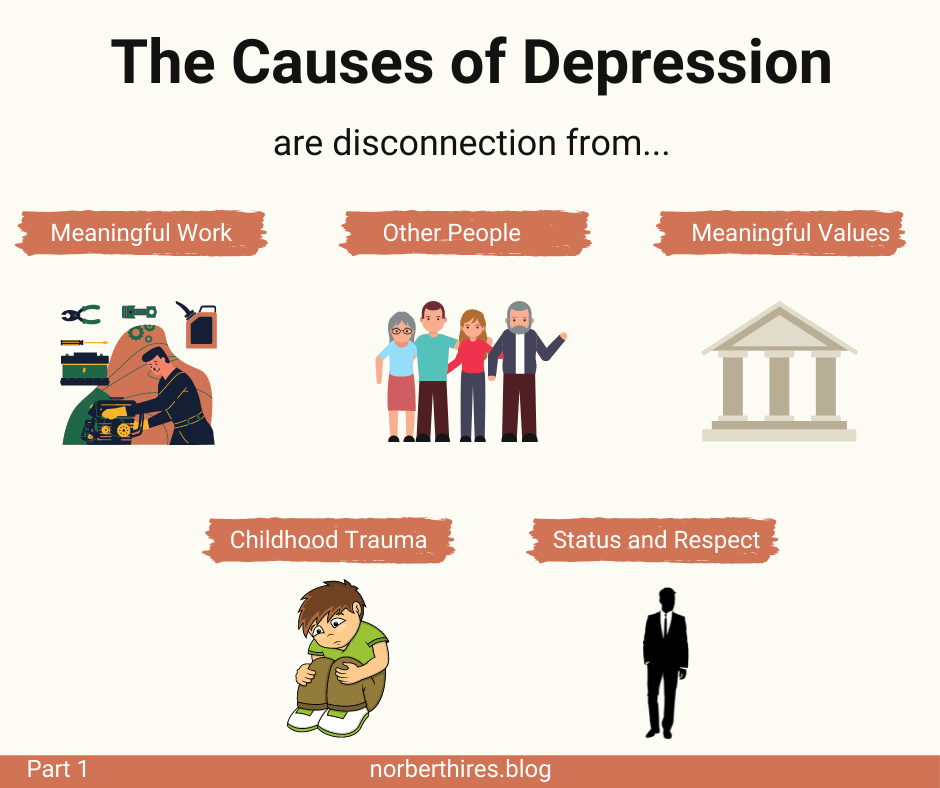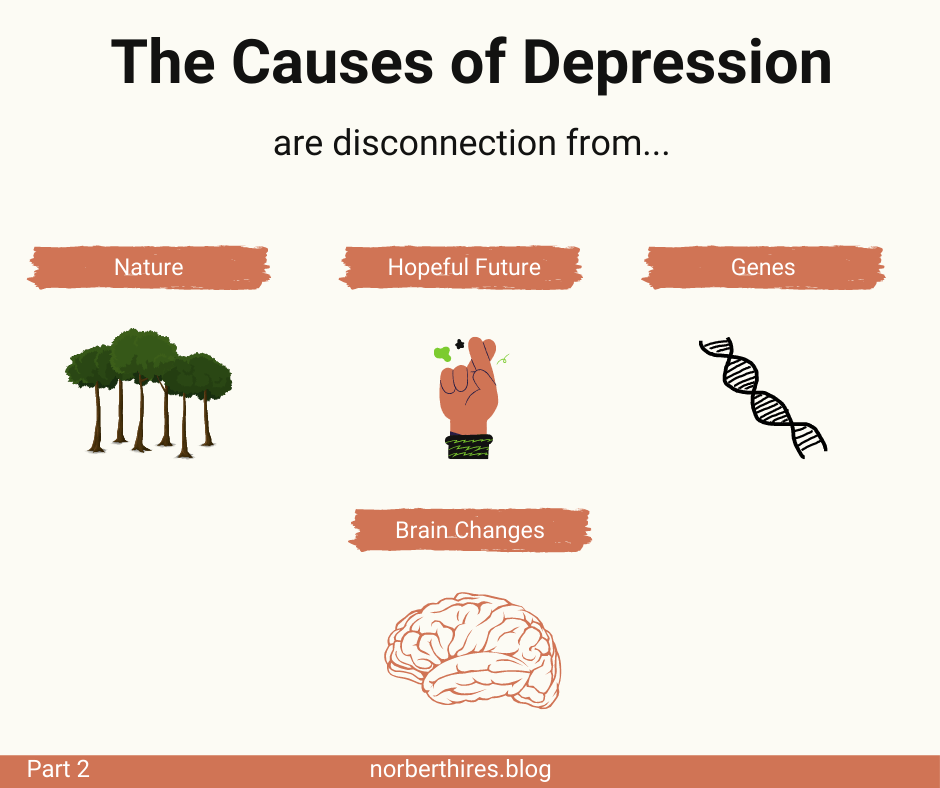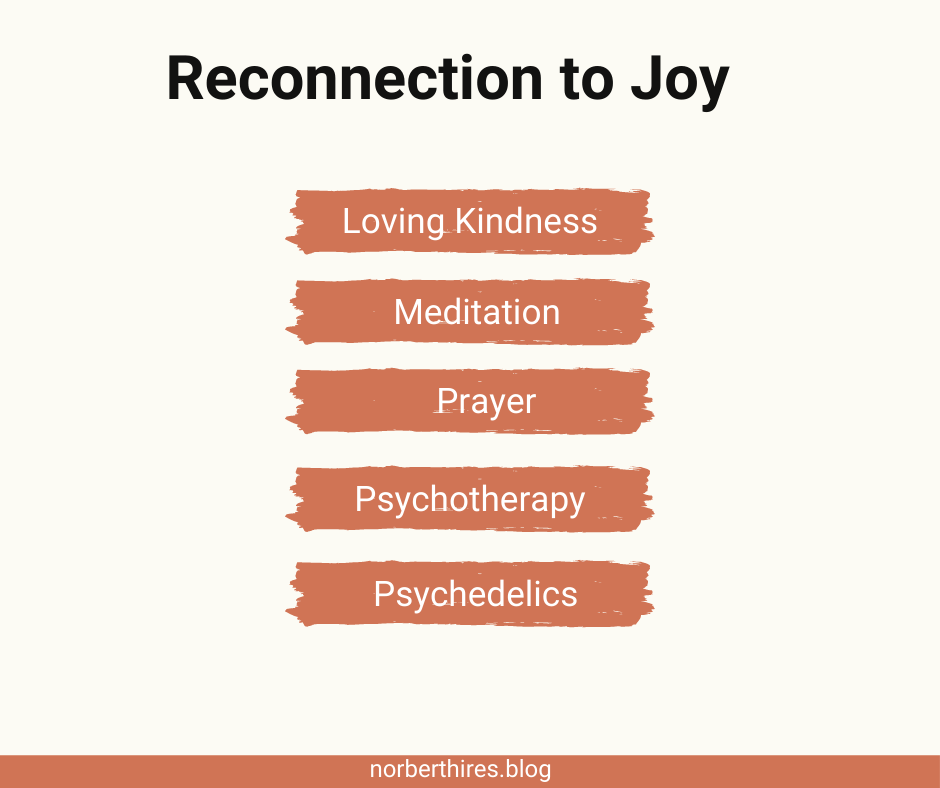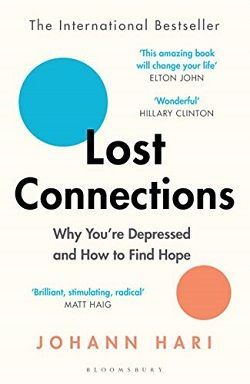Lost Connections: Review & Summary of Key Ideas
Depression and anxiety are the sharpest edges of a spear that are jabbed into everyone nowadays. But why is it so common and how to fix it?

Johann Hari is not writing about some distant topic in his book. The writer of Lost Connections: Why You're Depressed and How to Find Hope has been fighting depression for decades. This personal touch makes him enthusiastic about finding the real causes of depression and researching potential remedies.
Lost Connections is a non-fiction book about a serious subject. Despite these, I felt like I was on a great journey when reading the book. The author collected several interesting stories while the book is packed with research findings.
In this summary, I am sharing with you the main takeaways of the book about depression, life, and as it turned out about connections.
What is Depression?
The most common way of looking at depression is that it’s a brain dysfunction caused by a low serotonin level. To fix this malfunction you need pills to restore your brain chemistry.
This is the story the author got when he was diagnosed with depression. But pills did not work for him and do not work for a lot of people in the long term. It turned out serotonin levels alone can not answer the cause of depression.
Depression is not caused by when the brain goes wrong. It is caused by when life goes wrong. The brain just follows.
The Bio-Psycho-Social Model
Looking into the research of depression we can find that based on some mainstream schools, three fundamental aspects can be the root cause of mental disorders:
- Biological
- Psychological
- Social
Serotonin levels and a malfunctioning brain do not answer every question and pills can not solve depression alone based on these findings. They are only focusing on the biological aspects.
And focusing on serotonin is a lie.
Serotonin and Depression
Giving someone an easy-to-understand story about why they are suffering can be powerful. Pointing at serotonin level as the cause of depression provides exactly that: your brain chemistry is out of balance, take these pills and it will fix you.
But Johann Hari takes away this easy-to-digest story and replaces it with a complex matrix, with life itself. He starts to do this by researching the scientific evidence behind the connection between serotonin and depression.
It turned out that there were experiments where scientists drugged people to affect their serotonin levels and watched what would happen. But they didn’t become depressed. Also increasing serotonin levels did not solve depression.
Serotonin didn’t affect their mood at all.
It turned out that there is no scientific evidence behind that depression is caused by low serotonin levels.
“It hasn’t been discredited, he said, because “it didn’t ever get ‘credited,’ in a sense.”
What Causes Depression Then?
The author presents several researchers of different fields all focusing on examining depression. He finds a common point between the work of all these independent scientists:
The causes of depression are all a form of disconnection.
The Causes of Depression

1. Disconnection from Meaningful Work
- Control over work: A study focusing on civil servants found that professionals on the lower level of the hierarchy tend to be more likely depressed. The top civil servants have more authority, more control over their work, and more social activity after work.
- Work affects other aspects of life: “When work is enriching, life is fuller, and that spills over into the things you do outside work”
- Efforts and rewards: When tax inspectors do their job well, nobody notices. When there is no balance between efforts and rewards it can lead to derealization. You feel like nothing you are doing is authentic. Nothing you are doing matters.
2. Disconnection from Other People
- Loneliness is stressful: Loneliness causes as much stress as being punched in the face by a stranger. It’s no surprise loneliness can lead to depression.
- Share something meaningful: To end loneliness first you have to meet people. But you need to share some common values which are important for both of you.
- Two-way relationships: You can’t cure loneliness by transactional relationships. It is also not enough if the relationship only goes one way. It has to be a two-way relationship to make a difference. Give and receive.
- Individuality is BS: We started doing more and more things alone in the past centuries. Now we believe that nobody can help us, except us. But it’s a lie. Individuality is not the only way to advance.
- Social media is a parody: We are losing more and more connections and the alternatives are only bad jokes. Facebook friends are not replacing real friends. Video games do not count as meaningful work and status updates do not signal real status.
3. Disconnection from Meaningful Values
- Materialistic values are bad: We need values to guide us through life. Religions and strong intrinsic values are disappearing and they are replaced by the value system of capitalism. However, materialistic values are failing us and can not lead to a happy life.
- Materialists experience flow less often: Flow state, when you do something you love and immerse yourself completely in the activity itself is the proof that your intrinsic values are working. But when researchers were examining materialistic people, they found out that materialistic people experience flow states less likely.
- Advertisements make you materialistic: Ads can plant materialism into our minds. When examining teenagers watching ads, it turned out that the teens who watched more ads became more materialistic.
4. Disconnection from Childhood Trauma
5. Disconnection from Status and Respect
- Biggest stress factors: During examining bonobos stress levels, scientists found out that the two biggest sources of stress are connected to their status. First of all, they experience severe stress when their status is jeopardized (most of the time the leader's status). And they experience stress when their status is low.

6. Disconnection from the Natural World
- Walk-in nature cures depression: Walk-in nature can elevate mood and improve concentration for almost everyone. When researchers tested the effect of walking in the wild on depressed people, they found out that the positive effects of nature can multiply for them.
- Our concerns are small: The natural landscape is much greater than us and it can show us how small our concerns are in the grand scheme of things.
7. Disconnection from a Hopeful or Secure Future
- The Rise of Contract Jobs: In the USA and Germany around 20% of workers do not have a job contract, they are working from shift to shift, from project to project. This is a global trend that makes the future unpredictable and less secure.
- More expectation, less reward: The expectations we were raised with completely changed and we got less reward for our work.
8-9. The Real Role of Genes and Brain Changes
- Genes can evoke depression with stressful events: If you have some form of the 5-HTT serotonin transmitter then you have an increased probability of depression but only if you experience stressful events or trauma.
“It is no measure of health to be well-adjusted to a sick society.” Jiddu Krishnamurti
The Remedies of Depression: Reconnections
Reconnection to Other People
- Become a happier community: Based on happiness research, if people tried to be deliberately happier they could not manage that in the United States, but they could be happier in Russia, Japan, or Taiwan. In the West, we have an individualistic view of life, while in Asia it is more a collective perspective. The latter makes us happier.
“Don’t be yourself. Don’t fixate on how you’re worth it. It’s thinking about you, you, you that’s helped to make you feel so lousy. Don’t be you. Be us. Be we. Be part of the group.”
Reconnection To Meaningful Work
- Forget Karaoke Life: When you are singing a song written by someone else to the rhythm dictated by others and you have no opportunity to write your song, it can lead to frustration.
Reconnection To Meaningful Values
- Spend vs. Value: Ask yourself two questions: “What do you spend your money on?” and “What do you really value?” Find the gap between the two.
- Do not spend to fill a hole: People are spending money on things they do not value to fill some sort of loneliness gap. Researchers found that lowering someone's materialism can lead to higher self-esteem
Reconnection to Sympathetic Joy

- Chief Marketing Officer of Me: We are naturally learning how to display our lives in social media to evoke envy. We do not want to sell anything. We want only eyeballs. We want attention. We want others to be jealous of us.
- Feel happy for others: The opposite of evoking envy is feeling happy for other people.
- Loving Kindness Meditation: One way to feel happy for others is by practicing loving-kindness meditation. Picture yourself as something good happening to you. Then picture somebody you love experiencing a similarly positive experience. Then picture somebody you don’t know having the time of his life. At least picture somebody you don’t like and feel happy for him.
- Meditation helps: People who went to an eight-week meditation retreat recovered from depression more likely than the control group. Meditation can help you fight depression.
- Prayer helps: Even if you are not religious, prayer can be an effective remedy for depression.
- Psychotherapy helps: Last but not least psychotherapy is also an effective tool to reconnect. It can solve issues preventing you from establishing any kind of connection. Ego can protect us, but having too big an ego can prevent us from connecting with others.
- Psychedelics: Psychedelics (based on the stories in the book) provide a remarkable sense of connection. Psychedelics don’t fix you and don’t affect your brain chemistry in the long term. They provide an experience that shows you the possibilities of connections.
Reconnection to Acknowledging and Overcoming Childhood Trauma
- Confession works: Johann Hari is not a religious person but based on the evidence he thinks that confession is another form of reconnection. It builds on a basic human need (telling someone what happened to you who will not judge you for it). Confession has been around for hundreds of years. Maybe this is some kind of proof that it works.
- Shame makes you sick: During the AIDS crisis closeted gay men died 2-3 years earlier than openly gay men even if they got medical care. Shame makes you sick.
Reconnection to the Future
- Our surroundings make us sick: We can not solve depression and anxiety by focusing only on ourselves because our surroundings and the culture we live in make us feel anxious.
- Universal Basic Income: There is evidence that people who have a steady income from renting out properties are experiencing less stress. To tackle the changes in the future Universal Basic Income could have a similar effect. Everyone would get enough money to live but not be able to spend on luxuries.
- Don't weep, go big: The correct response to a crisis is not going home and weeping. It’s demanding change. Going ambitious and changing the surroundings to have a fair chance to be happy.
Review of Lost Connections by John Hari
If you read any non-fiction book recently, you can not feel that in Lost Connections the author share with you some big secrets. If you put the bestselling non-fiction books for the last five years beside each other, you will get the topics John Hari is talking about in his book (meditation, reconnecting to nature, letting our ego shrink, the value of the tribe, bullshit jobs, universal basic income).
But he puts together these concepts as a way to fight anxiety and depression which idea was not occurring for me before. The stories he shares and the research he put behind this book are also extraordinary. I didn't feel like I am reading only an opinion, because most of the concepts were backed by research. Despite the vast amount of references, reading Lost Connections felt like I am on a journey.
I hope you enjoy it as well!




